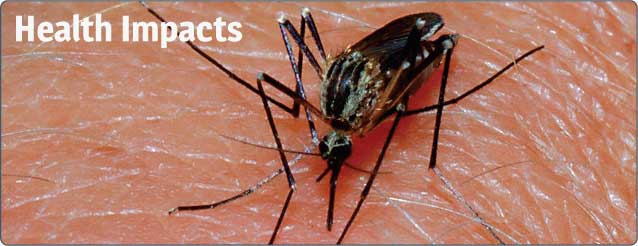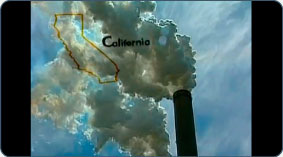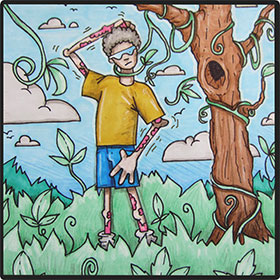
Photo Credit: dr_relling, under the Creative Commons Attribution 2.0 Generic license
Climate Change and Your Health...Just Say ‘Oh, no!’
As you may have noticed, there is plenty of evidence that climate change is taking place worldwide. This is just a sampling in regard to how it makes direct contact with your everyday activities as an active participant in the human race:
- In 1998, a hurricane dropped six feet of rain in three days in Central America. In its wake, the incidence and attendant deaths due to malaria, dengue fever, and cholera soared.
- A summer heat wave in Europe in 2003 lead to the deaths of tens of thousands, withered crops, and melted 10 percent of the Alpine glacial mass.
- The 2006 California heat wave was responsible for 655 excess heat fatalities, 140 coroner-confirmed heat deaths (confusing distinctions? Just bureaucratic categories but dead is dead), and more than 12,000 emergency hospitalizations.
- During the summer of 2011, a heat wave baked the central and southern United States and was blamed for at least two-dozen deaths. The National Weather Service put 141 million people in more than two-dozen states under a heat advisory or warning because of the soaring temperatures.
- In 2012, Hurricane Sandy hit a wide swath of the northeast and resulted in the loss of more than 100 people as it churned its way up the East Coast, with most of the deaths in low-lying sections of New York and New Jersey.
The operative word here is “deaths,” plural. The impact of climate change on human health is direct and very serious. And it is not just through Biblical-style catastrophes like the flooding and heat mentioned above. It brings with it more subtle yet forceful insinuations into your health, and that of your neighbors near and far.


Health impacts of climate change on local communities through disease, death, and displacement. Video features Natasha Prudent, Health Scientist for the Climate Change Program at the CDC and Dr. Kevin Sherin, Director of the Orange County Health Dept..


Climate Change Hits Home—Impacts on Human Health
Everyone Can Play!
by Arthur Mead, Jr.

Poison ivy, poison ivy; You’re gonna need an ocean of calamine lotion; You’ll be scratchin’ like a hound; The minute you start to mess around with...poison ivy.


How Climate Change Affects Your Health
Everyone is vulnerable to the health effects of climate change, but these effects will act as a stress multiplier for the world’s poor and for at-risk populations such as infants, children and seniors. Sure, you’re a tough guy who can take a 100-degree day. How about your parents and grandparents? Or your baby sister?
Less frequent but more intense precipitation events will have dire consequences for food supply and play an ever-increasing role in the emergence and re-emergence of infectious diseases. Today, America’s food production chain relies heavily on rapid road transit. Yet in Rhode Island’s 2010 flooding disaster, Route 95 was closed, the same as it was in the Blizzard of ’78 and in Superstorm Sandy in 2012.
Most vector-borne disease — mosquito, tick and flea — are intimately connected to seasonal weather patterns. Take the mosquito. Higher temperatures increase their rate of reproduction, the number of meals they take, lengthen their breeding season and shorten the maturation period for the diseases they carry.
Rhode Island and New England Risks (Adobe Acrobat)
“Climate change represents an inevitable, massive threat to global health that will likely eclipse the major known pandemics as the leading cause of death and disease in the 21st century...The health of the world population must be elevated in this discussion from an afterthought to a central theme around which decision-makers construct rational, well informed action-orientated climate change strategies.”
– Dr. Dana Hanson, President, World Medical Association
News
“Tourists Are Flocking to Locations Threatened by Climate Change. That Only Makes Things Worse.” Vox
Factoids
Heat waves caused by increasing temperatures pose a serious risk of heat-related illnesses and death to vulnerable populations, particularly the elderly and children.
Increasing air pollution has severe health effects, resulting in more respiratory problems such as asthma attacks and diminished lung function.
Extreme weather events such as increasingly intense hurricanes pose a threat to individual’s health during the event and during recovery and reconstruction; for example, mold resulting from flooding causes respiratory problems.




